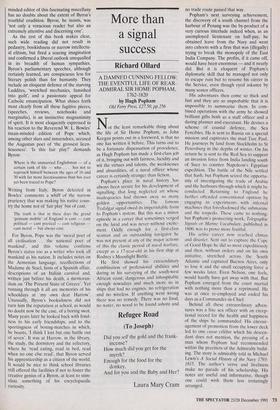More than a signal success
Richard 011ard
A DAMNED CUNNING FELLOW: THE EVENTFUL LIFE OF REAR- ADMIRAL SIR HOME POPHAM, 1762-1820 by Hugh Popham Old Ferry Press, £27.50, pp.256 Not the least remarkable thing about the life of Sir Home Popham, as John Keegan points out in a foreword, is that no one has written it before. This turns out to be a fortunate dispensation of providence, as Hugh Popham has made a first-class job of it, bringing out with fairness, lucidity and wit the virtues and talents, the weaknesses and absurdities, of a naval officer whose career is certainly stranger than fiction.
Popham's place in naval history has always been secure for his development of signalling, that long neglected art whose inadequacies had thrown away so many golden opportunities. The famous Trafalgar signal owed its imperishable form to Popham's system. But this was a minor episode in a career that sometimes verged on the lurid and was never without excite- ment. Oddly enough for a first-class seaman and an outstanding navigator he was not present at any of the major actions of this the classic period of naval warfare, except as a 17-year-old in his first ship at Rodney's Moonlight Battle.
Ile first showed his extraordinary combination of professional abilities and daring in his surveying of the south-west African coast, dangerous and inhospitable enough nowadays and much more so in ships that had no engines, no refrigeration and no wireless. If anything went wrong there was no remedy. There was no food, no water, no wood to be found ashore and
no trade route passed that way.
Popham's next surveying achievement, the discovery of a south channel from the harbour of Penang was the by-product of a very curious interlude indeed when, as an unemployed lieutenant on half-pay, he obtained leave from the Navy and went into cahoots with a firm that was (illegally) trying to break the monopoly of the East India Company. The profits, if it came off, would have been enormous — and it nearly did. But it is eloquent of Popham's diplomatic skill that he managed not only to escape ruin but to resume his career in the Service, even though eyed askance by many senior officers.
His adventures then come so thick and fast and they are so improbable that it is impossible to summarise them. In com- bined operations with the army he showed brilliant gifts both as a staff officer and a daring planner and executant. He devises a scheme of coastal defence, the Sea Fencibles. He is sent to Russia on a special mission and captivates the mad Tsar Paul. He journeys by land from Stockholm to St Petersburg in the depths of winter. On his return he is sent to the Red Sea to support an invasion force from India landing south of Suez to counter Napoleon's Egyptian expedition. The battle of the Nile settled that hash, but Popham seized the opportu- nity of investigating the trade of Arabia and the harbours through which it might he conducted. Returning to England he further offended conventional opinion by engaging in experiments with infernal machines that foreshadowed the submarine and the torpedo. These came to nothing: but Popham's pioneering work, Telegraphic Signals or Marine Vocabulary, published in 1800, was to prove more fruitful.
His active career now reached climax and disaster. Sent out to capture the Cape of Good Hope he 'did so most expeditiously and then, without orders and on his Own initiative, stretched across the South Atlantic and captured Buenos Aires, only to lose it and the small occupying force a few weeks later. Even Nelson, one feels, would hardly have got away with that. But Popham emerged from the court martial with nothing more than a reprimand. He was at once re-employed and ended his days as a Commander-in-Chief.
Behind all these extraordinary adven- tures was a fine sea officer with an excep- tional record for the health and happiness of the ships he commanded. His encour- agement of promotion from the lower deck led to one cause celebre which his descen- dant does not mention, the pressing of a man whom Popham had recommended within the precincts of the Admiralty build- ing. The story is admirably told in Michael Lewis's A Social History of the Navy 1793- 1815. The author's verve and liveliness make no parade of his scholarship. His notes are useful and informative, though one could wish them less irritatingly arranged.










































































































 Previous page
Previous page